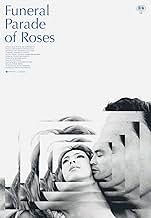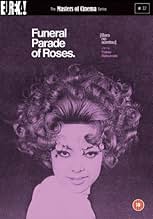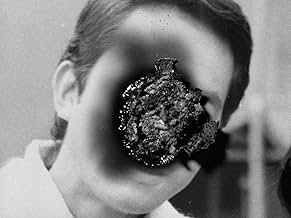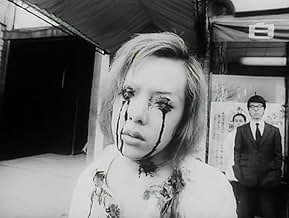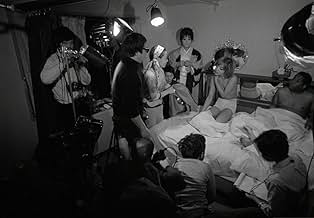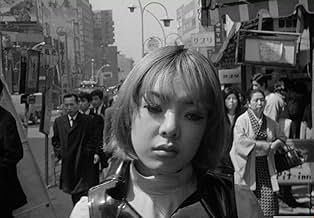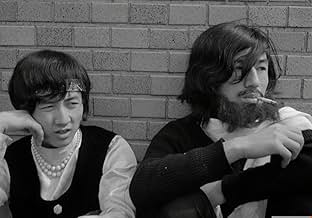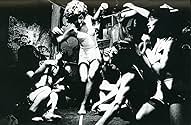VALUTAZIONE IMDb
7,7/10
8022
LA TUA VALUTAZIONE
Le prove e le tribolazioni di Eddie e altri travestiti in Giappone.Le prove e le tribolazioni di Eddie e altri travestiti in Giappone.Le prove e le tribolazioni di Eddie e altri travestiti in Giappone.
- Regia
- Sceneggiatura
- Star
Recensioni in evidenza
Eddie is a transvestite hostess at one of Tokyo's clubs. He/she spends her time working, being in the films of a friend, taking drugs and trying to find love.
Said to be one of Stanley Kubrick's favorite films and a big influence on Clockwork Orange this is probably one of the best films most people have never seen. Released in 1969 this film is as fresh and shattering as it must have been back when it was made. Set in a "Gay" world this is actually a movie about people and how they act and feel, the fact that they are gay is irrelevant. These are real people in a real world that seems to be happening now instead of when it was made (due no doubt to the stunning black and white photography). The film uses just about every 1960 "art film" technique you can think of and does so better than any film in from Europe ever did (Buñuel, and Bergman should have been this successful). Interviews of the cast, sudden juxtaposition of scenes, shifts in tone and style, sudden bursts of violence, all blend together to tell a story of a search for identity and place that is in its way universal, even if its outcome is not.
This is a movie that is simple to explain, but difficult to sum up. The effect of it being somewhat greater than the simplicity of the storyline.
See this movie. This is one of those movies that movie lovers should search out.
9 out of 10 (Because to be honest I'm not sure if I'm more in love with the technique or the film itself- though either way its a great film)
Said to be one of Stanley Kubrick's favorite films and a big influence on Clockwork Orange this is probably one of the best films most people have never seen. Released in 1969 this film is as fresh and shattering as it must have been back when it was made. Set in a "Gay" world this is actually a movie about people and how they act and feel, the fact that they are gay is irrelevant. These are real people in a real world that seems to be happening now instead of when it was made (due no doubt to the stunning black and white photography). The film uses just about every 1960 "art film" technique you can think of and does so better than any film in from Europe ever did (Buñuel, and Bergman should have been this successful). Interviews of the cast, sudden juxtaposition of scenes, shifts in tone and style, sudden bursts of violence, all blend together to tell a story of a search for identity and place that is in its way universal, even if its outcome is not.
This is a movie that is simple to explain, but difficult to sum up. The effect of it being somewhat greater than the simplicity of the storyline.
See this movie. This is one of those movies that movie lovers should search out.
9 out of 10 (Because to be honest I'm not sure if I'm more in love with the technique or the film itself- though either way its a great film)
10NateManD
"Funeral Parade of Roses" is an underrated unknown work of Japanese gay cinema. It was one of Stanly Kubric's favorite films, and it had a significant influence on the the style of "A Clockwork Orange". The film deals with Japanese drag queens, including the clubs, rivalry and their sex lives. In an Oedipus fashion, except reversed, the main character kills his mother so he can have relations with his father. Director Toshio Matsumato seemed to be way ahead of his time for his portrayal of sexuality and violence on screen. Also in a Bergman like fashion, actors are interviewed so the audience realizes it's only a movie.(and a twisted one at that) The film has many hallucinatory scenes, and who could forget the drag queens using urinals. There's also a weird fight scene between the two drag queens, and when they yell comic bubbles pop out of their mouths. Thank God this movie is in black & white! It's very brutal, disturbing and violent at times; so watch with caution. "Funeral Parade of Roses", is simply shocking and brilliant!
I am not a fan of avent-garde films, which I find are often pretentious and silly, but I enjoyed "Funeral Parade of Roses", primarily because I found the main character "Eddie" (played by Shinnosuke Ikehata aka "Peter") fascinating. The film is a non-linear composite of drama and documentary like vérité punctuated by abstract inclusions (jump cuts to stills, substitution splices, etc), some of which are more effective than others. Supposedly, Kubrick drew inspiration for "A Clockwork Orange" (1971) from this film and there are certainly some similarities (at one point Eddie looks straight at the camera through up cast eyes in a scene that reminded me of the iconic opening shot of "Alex" in Kubrick's film). Lacking much of a plot, "Funeral Parade of Roses" primarily peers into Tokyo's gay scene and follows Eddie, a transvestite 'bar girl' as he moves amoungst his friends (including pretentious auteur 'Guevara') in hopes of luring boss Gonda (Yoshio Tsuchiya) from rival, and bar 'Madame', Leda (Osamu Ogasawara), perhaps becoming 'Madame' himself. The black-and white cinematography is lovely, the characters intriguing and photogenic and the direction, for the most part, excellent (the interminable toking scene not withstanding). While the film is nonlinear, there is a traditional 'climactic' sequence at the end that is well worth waiting for and explains many of the references to the film being an Oedipal myth. Not to everybody's tastes but well worth trying out.
This is a movie that was made in the late '60s, early '70s period of Japan when Japan influenced by the Hippie culture was experimenting with their own brand of Avant Garde culture that was sometimes called "Angura". This is shortened Japanese pronunciation for "Underground". As the word suggests, these were experimental non-mainstream production that explored much about free sex, and anti establishment view of the world.
Gay culture was almost never picked up in Japanese movie up to this point, and it was first public exposure to the literally underground culture of the society at that time. This movie was also the debut for Pita or Shinnosuke Ikehata as Eddie. He has become somewhat of an icon for gay culture in Japan, but this movie was actually the first time he appeared as gay in public, and prior to that, he was only known as a beautiful boy dancer. His father was a natori of Japanese dance school, and he is a trained dancer himself.
Producers of this movie auditioned over 100 candidates, but couldn't find the right talent. Novel writer Tsutomu Minakami told the producers about "this boy" who was a go go dancer at a club in Roppongi. When the producers went to the club, and met the then 16 year old Ikehata, they knew they had the right person. Ikehata had a nick name Pita from Peter Pan, as he was so beautiful, and it was difficult to tell if he was a boy or a girl.
Story is bit convoluted, Eddie, who is the top host at the club Junne has intimate relation with the club's owner Gonda (Yoshio Tsuchiya). When the madam of the club Leda discovers this, he goes into a jealous frenzy, and tries to hurt Eddie. Eddie gets an idea to kill Leda, but that also brought back his suppressed memory of killing his own mother. Leda makes an attempt on Eddie's beauty by trying to cut his face, but fails. Gonda dumps Leda, and Leda commits suicide. But Gonda finds out the real truth about the relation between himself and Eddie.
The production of this movie is above average for avant garde movies made during this period. There's humor, talent, interesting point of view, and a real story. This is one of must see movies to come out of Japan.
Gay culture was almost never picked up in Japanese movie up to this point, and it was first public exposure to the literally underground culture of the society at that time. This movie was also the debut for Pita or Shinnosuke Ikehata as Eddie. He has become somewhat of an icon for gay culture in Japan, but this movie was actually the first time he appeared as gay in public, and prior to that, he was only known as a beautiful boy dancer. His father was a natori of Japanese dance school, and he is a trained dancer himself.
Producers of this movie auditioned over 100 candidates, but couldn't find the right talent. Novel writer Tsutomu Minakami told the producers about "this boy" who was a go go dancer at a club in Roppongi. When the producers went to the club, and met the then 16 year old Ikehata, they knew they had the right person. Ikehata had a nick name Pita from Peter Pan, as he was so beautiful, and it was difficult to tell if he was a boy or a girl.
Story is bit convoluted, Eddie, who is the top host at the club Junne has intimate relation with the club's owner Gonda (Yoshio Tsuchiya). When the madam of the club Leda discovers this, he goes into a jealous frenzy, and tries to hurt Eddie. Eddie gets an idea to kill Leda, but that also brought back his suppressed memory of killing his own mother. Leda makes an attempt on Eddie's beauty by trying to cut his face, but fails. Gonda dumps Leda, and Leda commits suicide. But Gonda finds out the real truth about the relation between himself and Eddie.
The production of this movie is above average for avant garde movies made during this period. There's humor, talent, interesting point of view, and a real story. This is one of must see movies to come out of Japan.
If you really are looking for a good time in a movie theatre - watch this movie ! It has been said that some of Kubrick's visual and sonic ideas for "Clockwork Orange" were inspired by this movie; after having seen it, i'm more than convinced that this is true.
This movie offers a lot of cinematic ideas and it uses surprising ways to make a point within a story.
What is the reason that films with a spirit and mood like that have vanished from the screen ? Have the politics in the movie industry really become so strict ? This movie watched nowadays has (but maybe had always) a subversive feel to it, why is that ?
It definitely offers something different and therefore would be very welcome in movie theatres and videostores around the world to free us from all the uninspired formula movies.
This movie offers a lot of cinematic ideas and it uses surprising ways to make a point within a story.
What is the reason that films with a spirit and mood like that have vanished from the screen ? Have the politics in the movie industry really become so strict ? This movie watched nowadays has (but maybe had always) a subversive feel to it, why is that ?
It definitely offers something different and therefore would be very welcome in movie theatres and videostores around the world to free us from all the uninspired formula movies.
Lo sapevi?
- QuizIl funerale delle rose (1969) gave Stanley Kubrick several visual and aural inspirations for his adaptation of Arancia meccanica (1971).
- BlooperTutte le opzioni contengono spoiler
- ConnessioniEdited from Ecstasis (1969)
- Colonne sonoreO du lieber Augustin
I più visti
Accedi per valutare e creare un elenco di titoli salvati per ottenere consigli personalizzati
- How long is Funeral Parade of Roses?Powered by Alexa
Dettagli
Botteghino
- Lordo in tutto il mondo
- 1114 USD
- Tempo di esecuzione
- 1h 45min(105 min)
- Colore
- Mix di suoni
- Proporzioni
- 1.37 : 1
Contribuisci a questa pagina
Suggerisci una modifica o aggiungi i contenuti mancanti


